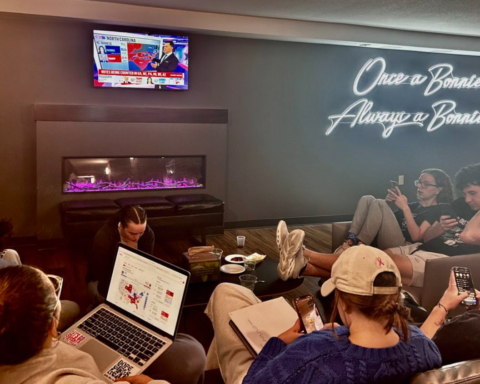Every Bonaventure freshman, hopefully, read “Dear America, Notes of anUndocumented Citizen” by Jose Antonio Vargas over the summer. As part of St. Bonaventure’s All Bona Reads Program, Vargas came to campus on Tuesday to give a speech.
Before the speech, 18 students had dinner with Vargas in the Reilly Center Hall of Fame. Twenty-three students, one from each SBU-101 class, were invited for their exceptional essays on Vargas’ book.
“This is, as we would say in California, hella formal,” Vargas said, regarding the dinner.
Students could ask questions during the dinner. When asked if he, if sent back in time, would still check the box saying he’s a citizen to get the job, he paused, then asked, “What would you do?” and explained how that decision is why he no longer has a path to citizenship. However, he then said, “I don’t know that I regret it.”
Vargas also said he is still working on multiple projects. One project is a novel about a woman who leaves her son at the airport for him to go somewhere else, and what she does after. The idea is based on his mother sending him to America but will be a fictionalized version of the events. He is trying to grapple with how his mother felt about that day. Exploring what life could have been like for her after sending him off. Vargas chuckled as he recalled seeing mothers cry while leaving their children for college. But it struck him as interesting that “this is the biggest amount of separation these mothers may ever feel from their children.” He is three chapters in and says they “suck.” He feels as though “making stuff up is more difficult than telling the truth. The fiction novel might take a decade to finish.”
His other book will be what he first wanted to make “Dear America” about. He wanted to make “a manifesto about global migration.” This was his intention for Dear America, but it just happened to become something else. Now he is working on the original idea.
Another project he is working on is a play about people waiting in the TSA line at the John F. Kennedy airport. Characters in the play will be people from many different countries and backgrounds. One of his inspirations is the play “Angels in America” by Tony Kushner.
Right after dinner was the speech. About 400 people, both students and faculty, sat in the bleachers of the Reilly Center basketball court.
Vargas began the speech by saying “as a writer I can’t think of a bigger honor than this,” referring to having his book assigned for us to read, then being asked to speak for us.
He then posed the question “Do laws define what an American is? Papers? Who here has a passport? Does having a passport define you as an American?”
The flowchart “The Game of Getting Legal” was displayed, showing the paths towards citizenship or being “screwed.”
Vargas ended the speech saying, “I hope you don’t take your citizenship for granted.” Those who were born here did not choose to be born here and did nothing to be born here, he said.
After the speech, a few more students had the chance to ask questions, one of which was “if you could make a law right now, what would it be?”
Shockingly, he answered, “No one can talk about America without understanding the full force of American history.”
Freshman journalism major Will McDonough found this to be a surprising answer coming from another journalist because he values the First Amendment. The First Amendment is such an important part of journalism there’s a lounge named after it in Murphy. The freedom of speech is a journalist’s most important tool, so a journalist saying he would take it away in any form seemed odd. Some justified this by using Vargas’ own words from the speech. He said, “I’m used to asking the questions, not answering them.”
One freshman, Thomas Reese, talked to Vargas during the book signing. Reese said “I had the unique opportunity to talk to him after the speech. Although I disagree with a lot of his viewpoints and his criticisms of our president, we also found a lot of common area on topics such as media bias, whether left or right leaning.”
By John Ancillotti, Staff Writer
ancilljm19@bonaventure.edu





